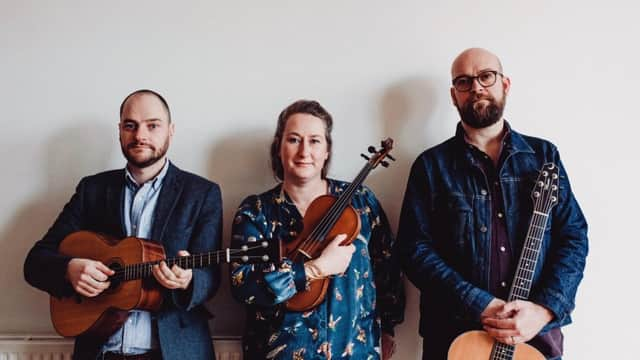Findlay Napier on how historic Scotsman folk columns inspired his new album


Among those who enthusiastically perused Buchan’s Weekly Scotsman columns was Findlay Cumming, an engineer who, among other things, worked on the hydro-electric schemes being built in the Highlands at that time, and who pasted Buchan’s epistles into an old-fashioned ledger. Cumming would die tragically young in a hill-walking accident, leaving a widow and four children: his folksong scrapbook, however, was passed down through the family and this month his grandson and namesake, singer-songwriter Findlay Napier, joined by his wife, fiddler and singer Gillian Frame and multi-instrumentalist Mike Vass, celebrate Cumming’s memory and breathe fresh new life into the songs he preserved in a new album, titled simply The Ledger.
Napier never knew his grandfather, but Cumming’s love of music permeated his family: Napier’s mother was a singer with Scottish Opera, for instance, while his brother Hamish, also a weel-kent figure on the folk scene, recently issued his third album celebrating their native Strathspey.
Advertisement
Hide AdAdvertisement
Hide Ad“The ledger was always about the house,” recalls Findlay, “and I always knew my grandfather loved singing and folk music.”
Napier, 41, has made a name for himself as a singer-songwriter, with albums such as Glasgow and Very Interesting Persons receiving critical acclaim. With The Ledger (Cheery Groove Records), however, he is very much touching folk-song base. Much of the impetus for the project, he says, came from Frame, whom he first met when he joined her Back of the Moon band in 2000. “We were trying to figure out something else to do together, and the more we started thinking about the idea of The Ledger, the more we liked it.
Napier and Frame’s vocal harmonies are at times strikingly reminiscent of the folk sounds around during the Sixties, although they were apparently inspired by more contemporary singing from the likes of the English duo Hannah Sanders and Ben Savage and the American male-female partnership of Gillian Welch and Dave Rawlings.
The guitar and fiddle accompaniments are effective without being over-demonstrative, with Vass adding his fiddle and tenor guitar skills as well as producing, and Euan Burton and Steve Fivey contributing bass and discreet percussion.
Sifting through the 64 songs in the ledger, they gave up trying to find a theme and settled on the ten they really enjoyed singing, leaving scope, Napier suggests, for a possible series of sequel EPs. Their choice includes such old favourites as Bonnie George Campbell, Van Diemen’s Land and Jamie Raeburn, all rendered fresh and purposeful. A sleeve booklet reproduces song notation and Buchan’s notes on now yellowing cuttings, just as Cummings had pasted them in, as well as the adjunct from this paper: “Do our readers know any more verses?”
There’s a particular pathos to one song, Walkin’ All Alane, which was newly written at the time of Buchan’s articles, though clearly drawing on the traditional ballad The Twa Corbies – to the extent of using the Breton tune appended to the ballad by Buchan’s fellow folk activist Morris Blythman. Buchan’s commentary credits its writer as “Anne Neilson, a 13-year-old Rutherglen girl,” and commends her “astonishing intuitive grasp of the folk tradition.”
Neilson went on to become a much loved and influential figure in the revival, as both singer and mentor. Sadly, she died suddenly last year. She had been Napier’s examiner at the Royal Conservatoire of Scotland and Frame’s singing teacher at the same establishment. Accordingly, the album is dedicated to her memory, as well as that of Norman Buchan – and, of course, Findlay Cumming, keeper of the ledger.
See www.findlaynapier.com and www.theledger.bandcamp.com